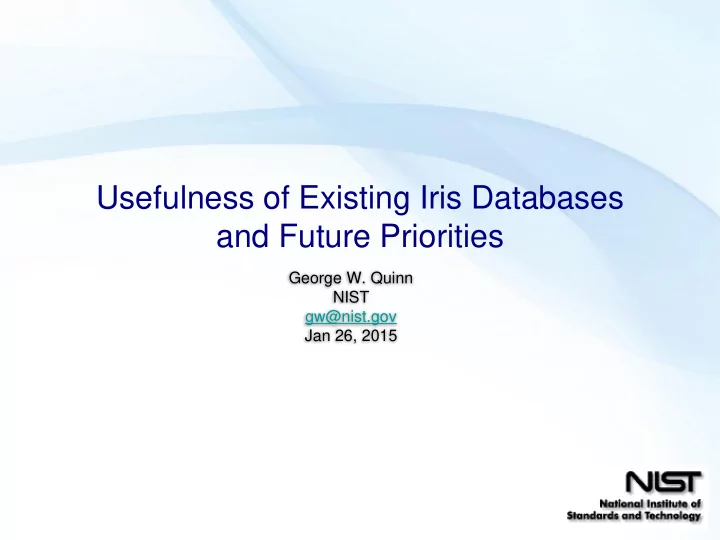

Usefulness of Existing Iris Databases and Future Priorities George W. Quinn NIST gw@nist.gov Jan 26, 2015
Current State of Iris Recognition Iris recognition is extremely accurate when the quality of the images is good. The IREX III supplemental report found that of 1,013 searches that failed to return the correct mate (for any of the top 3 matching algorithms), in every case there was some problem with one of the images. Performance of an operational system will be determined by the poorest quality samples and how frequently they occur.
Available Iris Datasets CASIA Notre Dame Iris-Thousand ND-IRIS-0405 Iris-Interval Cross Sensor Twins Time Lapse Long Range Template Aging Synthetic Iris Contact Lenses Iris-Lamp Gender Prediction Face / Ocular Challenge Clarkson University Q-FIRE (face + iris) West Virginia University Liveness Detection Multi-modal Off-Axis UTIRIS Synthetic Iris Visible + Near-IR University of Beira BioSecure UBIRIS.v1 Desktop Dataset UBIRIS.v1 MultiMedia University SmartSensors MMU1 IrisBase
Pupil Dilation “[W]hen matching … images of the same person, larger differences in pupil dilation yield higher template dissimilarities. ” - Hollingsworth, Bowyer, Flynn Computer Vision and Image Understanding , 2009 Dilated Constricted
Pupil Dilation
Contact Lenses Two types: 1) Vision correction lenses 2) Patterned contact lenses Vision Correction Patterned Contact spoofing? Notre Dame has a dataset of iris images of people wearing contact lenses: http://www3.nd.edu/~cvrl/CVRL/Data_Sets.html
Iris Ageing Iris Ageing Irreversible changes to the healthy iris or neighboring anatomy that yield mated dissimilarity scores that increase monotonically with time-separation of the compared images. - IREX VI
Iris Ageing* * Fenker and Bowyer use a different definition of ‘template ageing’. Figure Source: “Analysis of Template Aging in Iris Biometrics.” Fenker and Bowyer, IEEE Computer Sciety Biometrics Workshop , 2012
Iris Ageing IREX VI includes a comprehensive re-analysis of the Notre Dame iris collections. It also searched for an ageing effect in two other iris datasets: • NEXUS (Canadian border crossing) • OPS (Operational data from DoD) Conclusion: “[W]e find no evidence of a widespread iris ageing effect” The re-analysis of the Notre Dame data concluded that when you normalize for pupil dilation and eyelid occlusion, the apparent ageing effect goes away. With normalization Without normalization Reject Rate Decision Threshold Decision Threshold
Irregular Pupils The IREX III Failure Analysis Report determined that 45 of 1,013 failed searches probably failed due to abnormal pupil shapes. Possible Medical Explanations: Coloboma Tadpole Pupil Image Sources: medicalpicturesinfo.com, pbs.org
Illumination Differences in illumination can make non-flat surfaces appear different. source: landsat.gsfc.nasa.gov
Illumination Most cameras illuminate from the front to restrict specular highlights within the pupil. Differences in illumination can still occur due to ambient lighting. Ambient lighting can also introduce Purkinji Images.
Illumination NOTE: CASIA-Iris-Lamp 4.0 contains images where a lamp was turned on near the subject to ‘introduce more intra - class variations’, but the images do not contain noticeable Purkinji Images.
Eye Colour Does the colour of the eye affect recognition accuracy? Lighter coloured eyes seem to have more pronounced features (at least according to my own personal observation!) Green Eye Brown Eye
Eye Colour D02P , blue/green/grey G01P , blue/green/grey I02P , blue/green/grey D02P , brown G01P , brown I02P , brown 0.1 0.05 FNIR Light eyes 0.02 Dark eyes 0.01 0.0001 0.0002 0.0005 0.001 0.002 0.005 0.01 0.02 0.05 0.1 0.2 FPIR (Enrolled Population Size = 1,600,000)
Iris as a Forensic Forensic Science “The application of scientific knowledge and methodology to legal problems and criminal investigations.” - legal-dictionary.thefreedictionary.com Source: National Geographic Webcam Image Source: 2001: A Space Odyssey (film)
Future Areas of Research Surgical alterations Neo-natal Ageing Iris at a distance Abnormal Pupils Purkinji Images Also, larger sets of iris images wouldn’t hurt (i.e. with more subjects represented).
Datasets Referenced University of Tehran (UTIRIS) – Visible and Near-IR iris captures. https://utiris.wordpress.com/ Notre Dame (ND) – Iris Ageing, Contact Lenses (and more) http://www3.nd.edu/~cvrl/CVRL/Data_Sets.html CASIA-Iris-Lamp – Images with a side lamp turned on/off http://biometrics.idealtest.org/
Thanks George W. Quinn http://iris.nist.gov/
Recommend
More recommend